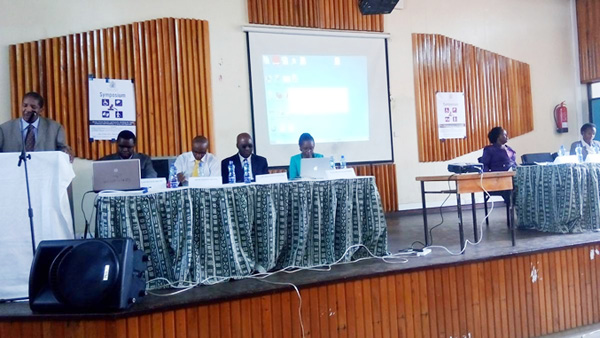On 13 December 2016 it will be the tenth anniversary of the adoption of the Convention on the Rights of Persons with Disabilities (CRPD). The Convention which came into force in 2008 has to date been ratified by 43 African countries including Kenya. The Disability Rights Project at the University of Nairobi’s School of Law hosted a public symposium at its Parklands Campus on the 30th of June 2016 to explore the character, prospects and challenges of realizing the rights of persons with disabilities protected under the CRPD in Kenya and regionally.
Professor Patricia Kameri-Mbote, Dean of the School of Law opening the symposium cautioned that constitutional provisions in law affirming that all people are equal before the law do not automatically make people equal. There is a need particularly in the context of historically marginalised groups to go a step further to dismantle the underlying systems and structures that continues to perpetuate unequal treatment of the group. She added that a lack of recognition of persons with disabilities in the main provisions of law often shields systemic institutional barriers.
Professor Charles Ngwena, Professor at the Centre for Human Rights, University of Pretoria reflected on the question of whether the CRPD is a revolutionary paradigm-shifting human rights instrument. He said that the CRPD introduces a new way of thinking about human rights and the rights of persons with disabilities by putting difference and particularity at the centre of the discussion. More than just affirming existing rights, the CRPD amplifies the rights of people with disabilities through innovative affirmation.
Dr Reginald Oduor, Senior Lecturer, Department of Philosophy, University of Nairobi speaking at the conference called for enhancing domestication and enforcement of the CRPD through the use of indigenous thought. He argued that it was possible to domesticate the discourse of norm setting with the rights of persons with disabilities through an African communalist perspective.
Building on Dr Reginald Oduor’s sentiments, Ms Elizabeth Kamundia, a doctoral candidate at the Centre for Human Rights showcased how persons with disabilities and their representative organisations are translating the generalities of the CRPD into tangible benefits for persons with disabilities.
The School of Law at the University of Nairobi will from this year offer a module on Disability Rights Law as an elective for 4th year law students which willbe taught by Commissioner Lawrence Mute, Lecturer at the School of Law and Commissioner African Commission on Human and Peoples’ Rights. Commissioner Mute during the symposium thanked Open Society Initiative for Eastern Africa (OSIEA) for their support in the creation of the Disability Rights Law module.
The symposium which had over 200 people in attendance brought together a mix of academics, practitioners and students.The Disability Unit at the Centre for Human Rights and the School of Law at University of Nairobi will continue to work closely together in promoting the education of future disability rights advocates in a manner that equips them with practical skills and inspires them to work on disability rights issues.
For more information on the symposium visit http://law-school.uonbi.ac.ke.
For more information on the Disability Rights Project at the University of Nairobi’s School of Law contact:
Lawrence M. Mute, OGW
Lecturer, School of Law, University of Nairobi
Commissioner, African Commission on Human and Peoples' Rights
Chairperson, Committee for the Prevention of Torture in Africa
Mobile phone: +254-721-647-899
Email: lamumu07@gmail.com
Skype: Lawrence.Murugu
Twitter: @lamumu07
For more information on the Disability Rights and Law Schools Project contact:
Innocentia Mgijima-Konopi
Project Coordinator: Disability Rights and Law Schools Programme
Tel: +27 (0) 12 420 4531
Fax: +27 (0) 63 316 5126
Email: Innocentia.Mgijima@up.ac.za


